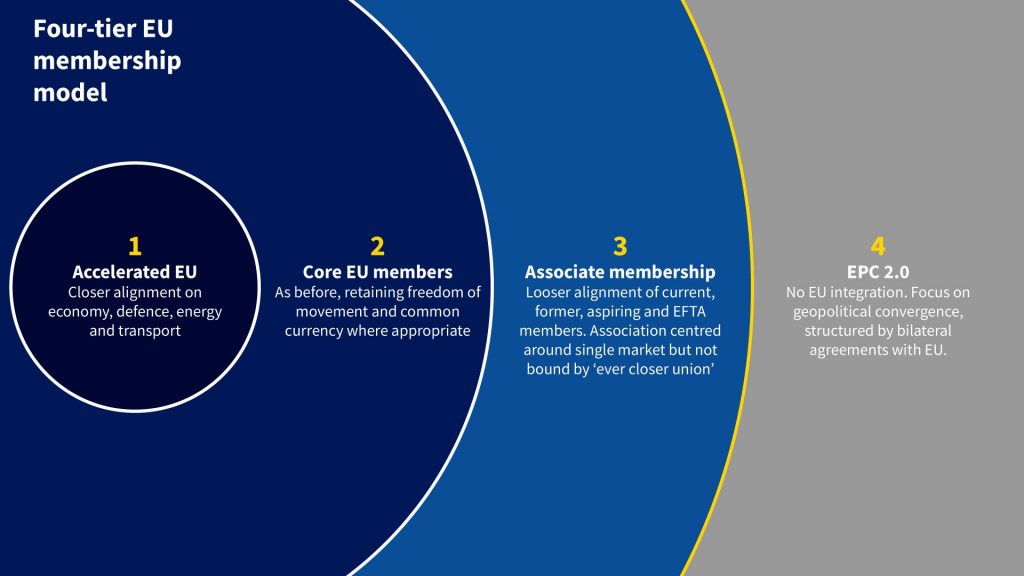Like many a minibreak tourist shopping on the Champs Élysées, Keir Starmer has hopped over to the channel and picked up rather more than he expected – in this case, a plan for Britain to be granted “associate membership” of the EU.
As Labour’s leader, and Britain’s likely next prime minister, visited Paris for talks with Emmanuel Macron, France and Germany were preparing to unveil a vision of a four-tier Europe that would offer the UK access to the single market, in return for an annual contribution to the EU’s budget and an agreement that disputes would be governed by the European Court of Justice.
Their report says: “The basic requirement would be the commitment to comply with the EU’s common principles and values, including democracy and rule of law. The cost areas of participation would be the Single Market.”
Yet as he met Macron, it was unclear how Starmer would react to a proposal that looks at first glance very similar to Norway’s current deal with the EU. That offers single market access but means a commitment to free movement.
Starmer has already ruled out a return to the single market for precisely this reason – believing that agreeing to it ahead of a general election would be seized on by Brexiteers as opening the immigration floodgates. It would be a tough sell as Labour attempts to win over Leave voters.
The plan was due to be presented to a meeting of Europe ministers for existing EU countries in Brussels on Tuesday by Laurence Boone and Anna Lührmann, and the timing may be no coincidence – a diplomatic source told The Times that the proposal had been crafted to appeal to a future Labour government.
Macron has been touting his vision of a new Europe since May last year, when he spoke of a “European political community” that could include departed EU members but also bring aspirant members like Ukraine, Moldova and Georgia into the fold far quicker than would be possible under the current accession system.
He said: “This new European organisation would allow democratic European nations adhering to our set of values to find a new space for political cooperation, security, cooperation in energy, transport, investment, infrastructure, and the movement of people, especially our youth,” Macron said.

The new four-tiered plan, which the report’s authors hope will be put into practice by 2030, would see countries committed to deeper union – likely to be France, Germany, Italy, Spain and the Netherlands – pressing ahead with further integration on the economy, defence, energy and transport. A second ‘core EU’ tier including countries like Ireland, Belgium, Denmark, Greece, Poland, Portugal, Romania and Sweden would proceed as before.
Britain would be invited to join the third tier, which could include countries currently outside the EU but with close financial links, including Norway and Switzerland. It may also include aspirant members like Ukraine, countries whose accession has proved problematic like Albania and Turkey, and existing member countries like Hungary who have a history of conflict with the EU.
Membership fees would be lower than contributions by full members, but would result in “lower benefits” – such as no access to the EU’s common agricultural fund. Britain would be allowed to speak in the European Commission and Parliament but would have no MEPs and no voting rights.
The fourth tier is likely to be comprised of countries who want “no EU integration but a focus on geopolitical convergence structured around bilateral agreements with the EU.”
Though the best deal for Britain would of course be a return to the core EU, a chance to re-enter Europe’s orbit would bring with it many positives for business, notably an end to much of the red tape crippling British SMEs and an easing of pressure on ports.
Even the feared (by some) freedom of movement would help the various sectors of British trade that are crying out for workers from the EU, would reduce queues for travellers and would make it easier to deal with refugees.
Yet Starmer could decide that pushing Britain towards associate membership now might push him out of his current pole position for Number 10. This may be one gift that he leaves in Europe, ready to pick up at a later date.











